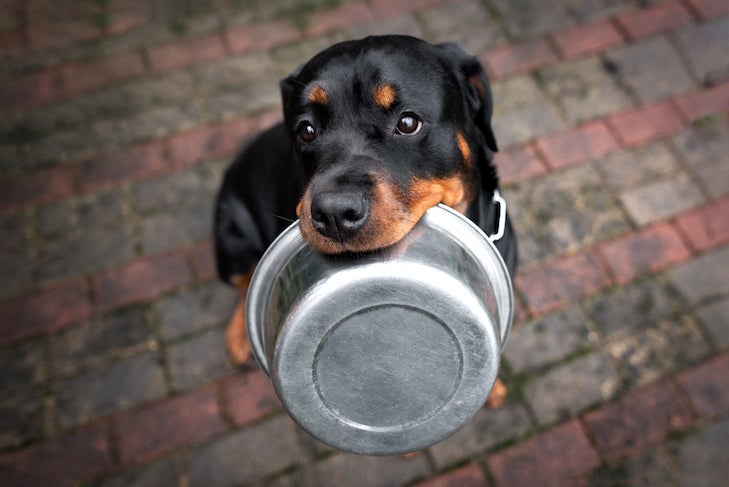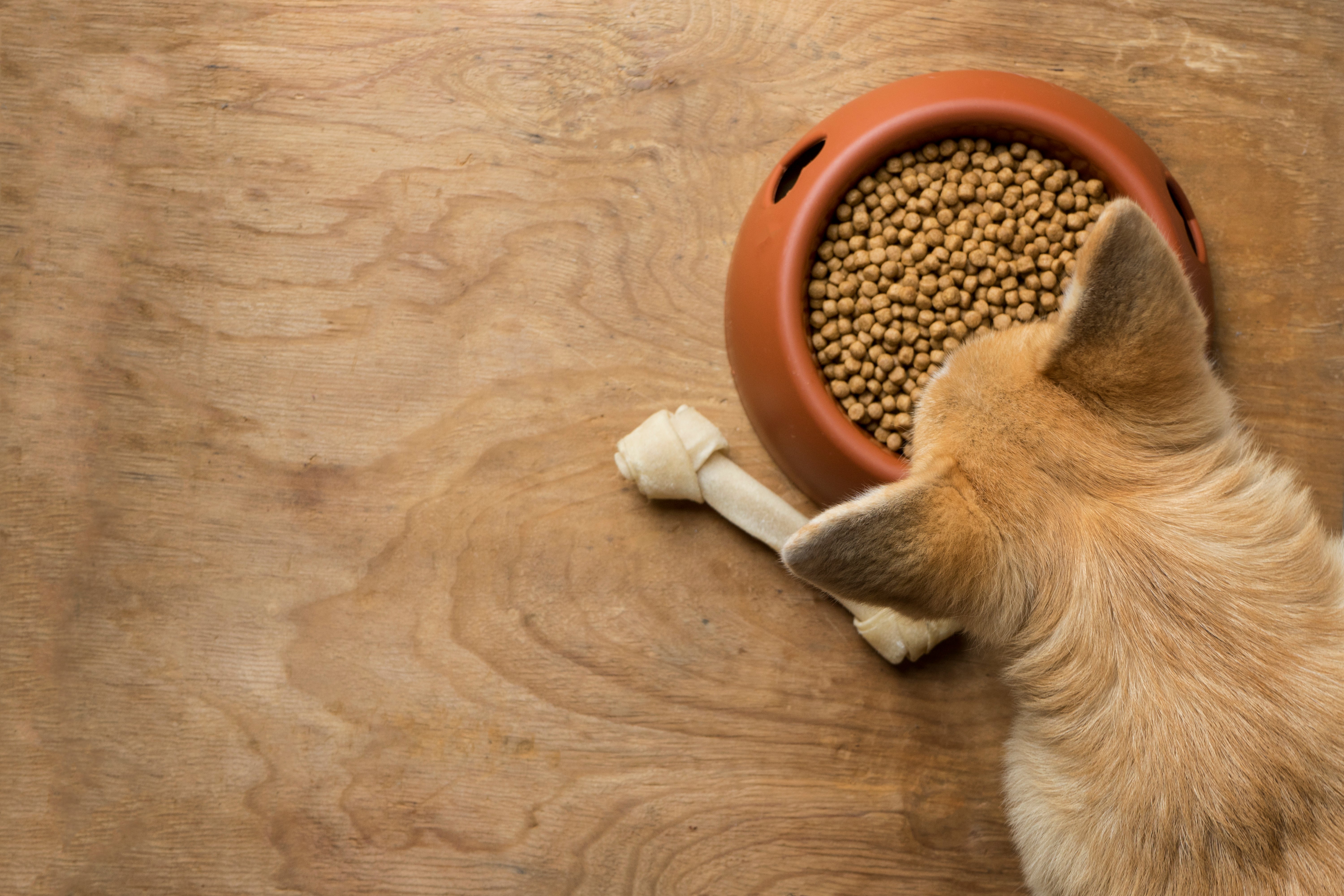Diets are always coming and going, and people are always trying new ways to lose weight. Whether it’s counting calories, keto, or something similar, one diet you that’s been growing in popularity is intermittent fasting. Research shows that intermittent fasting is generally safe for humans and promotes moderate weight loss. If your dog is overweight, you may want to consider similar diets that have worked for you to help them shed a few pounds. But is intermittent fasting for dogs actually safe?
Since obesity in dogs puts them at greater risk for health problems, such as cancer and heart disease, some might consider intermittent fasting as an option to keep our dogs at a healthy weight. But even small changes to our dogs’ diet can have consequences for their health. Dogs have specific nutritional requirements that can change, depending on their age, activity level, and any underlying health issues. Before adjusting your dog’s diet in any way, talk to your veterinarian.
Digestion and Fasting in Wolves and Dogs
Wild wolves need to hunt or scavenge for food, and go through periods of fasting. Because dog and wolves share genetic similarities, some people might think intermittent fasting could be safe for dogs. However, we don’t know much about the specific wolf populations that were dogs’ closest ancestors. Researchers suspect that dogs are descendants of a now-extinct relative of the grey wolf, but when and how this evolution occurred remains unclear. Regardless, dogs and wolves are not interchangable and are not the same, so things like diets for one may not be safe for the other.

In contrast, as dogs became domesticated, their digestive systems adapted in response to living with humans. Learning to understand verbal cues and cooperate with humans meant that dogs had more reliable access to food and did not have to go through as many periods of fasting. “Dogs have the ability to digest certain carbohydrates that wolves generally do not,” says Dr. Jerry Klein, DVM, Chief Veterinary Officer for the American Kennel Club. “The environment of dogs has allowed the adaptation of their gut microbiota to handle a starch-rich diet.”
Intermittent Fasting for Dogs
There are several ways that humans practice intermittent fasting, such as not eating during certain hours of the day or specific periods of the week. Advocates of intermittent fasting for dogs have suggested that it can benefit a dog’s immune system, digestive health, cognitive function, and longevity. “These are mostly anecdotal reports and not scientific studies,” notes Dr. Klein.
Since hospitalized dogs are at risk of underfeeding and depressed immunity, researchers conducted a study on the effects of intermittent fasting on immune health in healthy dogs only. They randomly assigned 10 healthy dogs to three different feeding regimens. Dogs in the intermittent fasting group tended to lose more weight and had lower blood glucose and insulin concentrations. Fasting didn’t cause immunosuppression, but the sample size was small and only contained healthy dogs.

The link between how frequently you feed your dog and various health outcomes has also been a subject of study in the Dog Aging Project. Since 2019, researchers have been collecting information on over 24,000 companion dogs to determine how genetic, lifestyle, and environmental factors affect the aging process. Included in the study are dogs of all ages, sizes, and breeds.
According to data from the study, dogs fed once a day had fewer health problems, including cognitive dysfunction, gastrointestinal issues, dental disease, orthopedic problems, kidney or urinary problems, and liver or pancreatic disorders. Although this was differentiated between dogs by the rate of which they were fed, the decreased health problems cannot be solely attributed to that. More research is needed to establish a direct cause-and-effect relationship between once-daily feeding and improved health, versus other contributing factors.
When Should I Fast My Dog?
You should only fast your dog after consulting your veterinarian and being advised to do so. For example, if your dog is experiencing gastrointestinal issues such as diarrhea or vomiting, your veterinarian might recommend temporarily fasting your dog. Typically, your dog would fast for 12 to 24 hours and only consume water during this period, Dr. Klein explains.
As your dog’s condition improves, you can gradually introduce a small amount of bland food such as pumpkin or plain boiled white rice. This allows time for the gastrointestinal tract to rest and for any inflammation to clear.
Regardless of their feeding regimen, your dog always needs access to fresh drinking water. Dr. Klein explains that dogs are more likely to suffer ill effects and die from dehydration than malnourishment.
When to Avoid Fasting Your Dog
Often, our goal is to keep our dogs fit and lean. Intermittent fasting “should only be considered in healthy, adult dogs,” says Dr. Klein. He advises that fasting should be considered only after a thorough discussion with a veterinarian or a board-certified veterinary nutritionist. An expert should help you determine if there is a need for fasting or if it’s the best approach for your dog. That said, intermittent fasting is not appropriate in the following situations:
- Puppies under 18 months, particularly if they belong to giant breeds that grow rapidly, such as the Bernese Mountain Dog, Mastiff, and Newfoundland
- Very small dogs or Toy Group breeds, such as the Chihuahua or Yorkshire Terrier
- Pregnant or nursing dogs
- Dogs with underlying medical issues, such as diabetic dogs being treated with insulin

“Appropriate daily feeding, using minimal low-calorie treats, avoiding table scraps, and exercising them regularly [is best],” Dr. Klein explains, “rather than having to resort to fasting.” For adult dogs engaged in normal activities, you can consider feeding them once a day.
Although intermittent fasting is having a resurgence among people, there are risks when we apply these dietary practices to our dogs. “Dogs have different metabolisms and nutritional requirements than people and most other animals,” Dr. Klein says. His advice is to feed your dog a complete and balanced diet as directed by your veterinarian and the dog food’s label.

